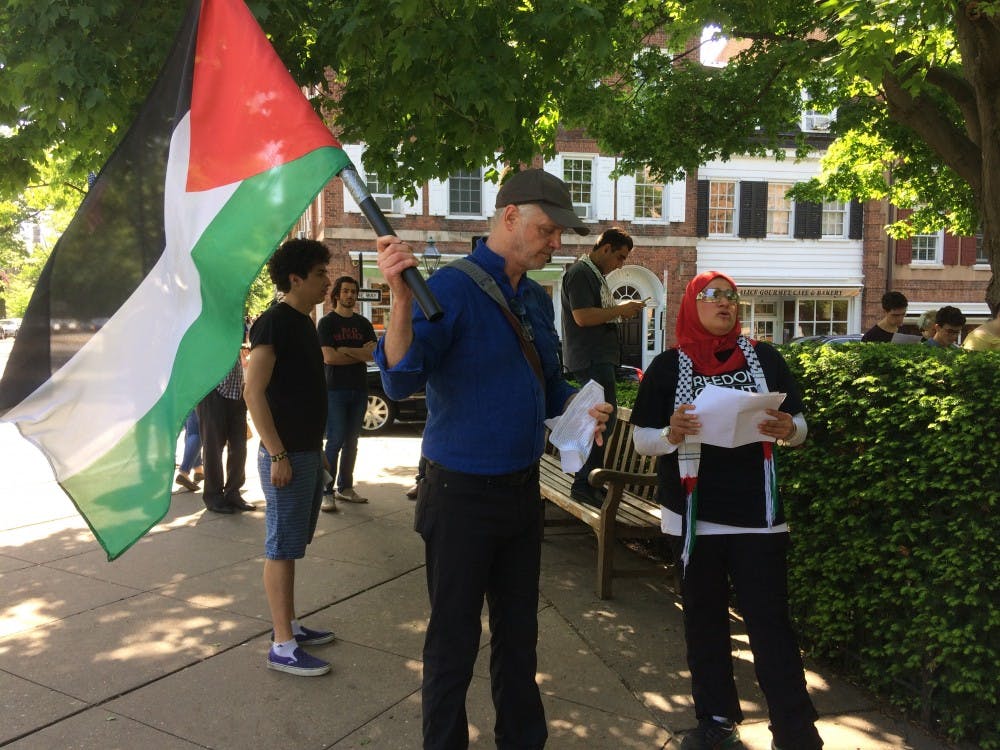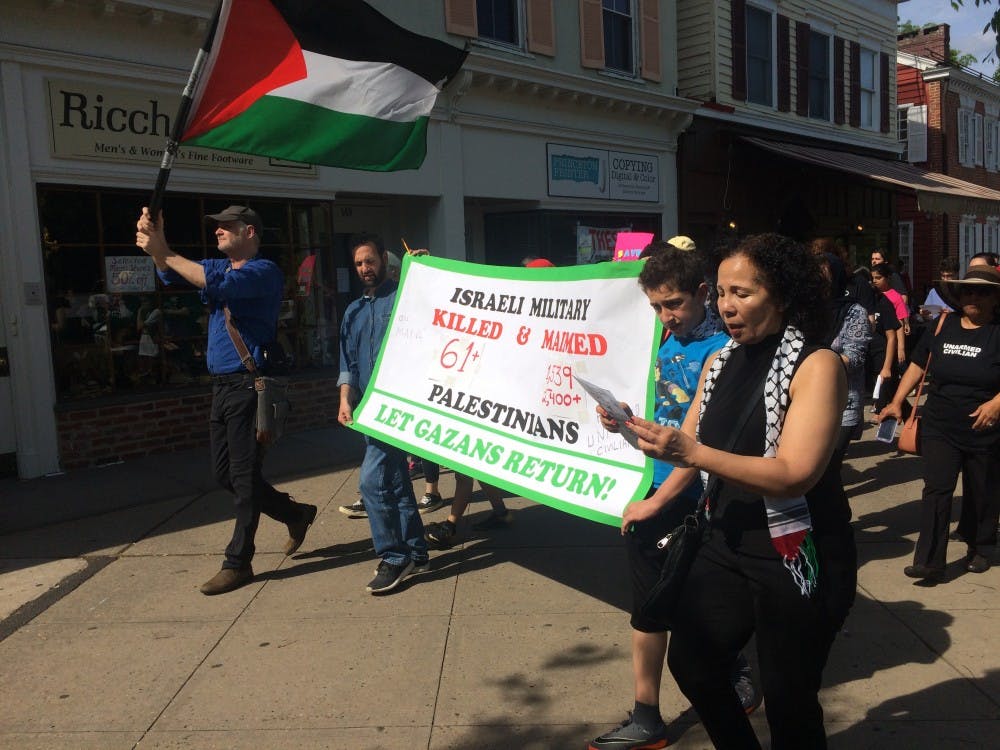Protesters broke the calmness of downtown Princeton on Sunday, May 20, when approximately 60 people marched through the streets, chanting the names of the 62 Palestinians slain by Israeli forces on May 14. The tragedy coincided with the move of the U.S. embassy to Jerusalem and marked Gaza’s bloodiest day since 2014. May 14 also marked the 70th anniversary of the formation of Israel, a historic day of celebration for Israelis and catastrophe for Palestinians. The “mourners’ march,” which was organized by Jewish Voice for Peace — Central New Jersey, aimed to uphold and remember those who protested and were killed in Gaza by Israeli forces.
The march began at Hinds Plaza at 3:30 p.m. and wound its way through downtown Princeton, resting at Palmer Square briefly before walking past FitzRandolph Gate to Thomas Sweets and then back to Hinds Plaza. All the while, protesters chanted the names of the 62 slain, including Laila Anwar Al-Ghandoor, an 8-month-old baby. The names were occasionally interspersed with chants of, “Why did they die? What did they do? What was their crime? They were Palestinian! That was their crime!”
Professor Mark Taylor, who teaches Christian theology at the Princeton Theological Seminary, waved the Palestinian flag in front of the procession. He explained the importance of keeping the memory of the massacred Palestinians alive.
“I understand this event to be about remembering and not letting die the witness and protest of the 60 plus Palestinians who were slain last Monday the 14th,” he said. “They’re not terrorists. They’re people in an outdoor prison. They’re caged.”
He said that while many Christians uncritically support Israel, there are others like him who insist on speaking out. He observed that many people of different faiths — Jews, Muslims, Christians, and non-religious people — were present at the rally.


The May 14 protests in Gaza were part of a larger six-week-long series of protests called the “Great March of Return.” The protests began on March 30 in commemoration of Land Day, when in 1976 six Arab citizens of Israel were killed by Israeli forces for protesting the confiscation of their land. The protests were planned to culminate on May 15, the 70th anniversary of the Nakba — which means “catastrophe” in Arabic — referring to the displacement of over 700,000 Palestinians from their homes in 1948 for the establishment of the Israeli state. The executive director of Jewish Voice for Peace, Rebecca Vilkomerson, described the massacre on May 14 as part of an “ongoing Nakba” in a statement released that same day. Today, there are more than 5 million Palestinian refugees — defined as Palestinians displaced in 1948 and their descendants.
Tzvia Thier, a 74-year-old Israeli-American organizer who at age six fled Romania for Israel with her family after World War II, has been active in Jewish Voice for Peace over the past several years. The national left-wing activist organization focuses on the Israeli-Palestinian conflict and supports an end to Israeli occupation of West Bank, Gaza Strip, and East Jerusalem. It supports the Palestinian “right to return,” among other things. All people, regardless whether they identify as Jewish or not, are welcome in the organization.
“I want people to understand what really is going on,” Thier said. “First of all, there’s no conflict. Conflict is between two equal parties. They’re not equal parties. There is the oppressor and the oppressed.”
Thier talked about how the current situation in Palestine is the result of deep bias. She said that growing up in Israel meant she was constantly exposed to anti-Arab ideology.

“The indoctrination is so deep,” Thier said. “I’m not surprised that most Israelis just don’t care about [Arabs]. I know what I was told. I was told that Arabs are primitive, cruel, they want to throw us to the sea.”
Thier’s friend Amal Awad, who is Palestinian, read the names of the 62 slain aloud and in Arabic during the march.
Awad said she was happy the march brought awareness to the plight of Palestinians since the move of the U.S. embassy to Jerusalem. However, she said she believes the violence was part of a longer massacre of Palestinians by Israeli soldiers in reaction to the Great March of Return.
Awad explained that Princeton's Jewish Voice for Peace protest was an exercise of freedom and privilege that Palestinians are not afforded.
“We are here because we can speak,” she said. “Over there, when people protest, they get shot. Over here, we might get a counter-protest.”
The chants were also led by two small boys, brothers aged 12 and eight, who were brought to the protest by their father. Their young voices pierced the air and their shouts of “Free Palestine!” and “Free Gaza!” went quite far, reaching curious onlookers.
Alec Israeli ’21, a member of Young Democratic Socialists who attended the protest said that it successfully disrupted the daily lives of people and drew attention to the issue.
“I remember there was a car that honked their horn and someone raised their fist out the window out of solidarity,” he said in an interview with the ‘Prince.’
“There was definitely a reaction from the town, whether it was explicitly positive or negative is not really the question. The question is, ‘did people notice it?,’ and I think people did.”
Some passersby who had not heard about the march beforehand were sympathetic to its cause. One elderly woman said that while she wouldn’t join the protestors, she agreed that the Palestinians were in a tragic situation. University students who passed by the march said that it contrasted with pro-Israel activism on campus.
Students involved in pro-Palestinian activism on campus recounted how their work is an uphill battle.
One student, a former editor at the Daily Princetonian, said that she felt numb when she first heard about the rising death toll of Gazans since March 30. The ‘Prince’ granted her anonymity for safety reasons.
The staffer said that she had heard all too often of unarmed Palestinians dying at the hands of Israeli Defense Force soldiers, and she found that the people bringing attention to the issue were the same people who had always cared.
She expressed frustration that campus dialogue has not emerged in the past month, especially within campus Jewish groups, given that resistance and violence in Gaza has reached a critical point. She said that she wished she could discuss Jewish identity, Israel, and violence more openly on campus.
The Alliance of Jewish Progressives declined to give a statement for this story. The Center of Jewish Life did not respond to request for comment.
Tigers for Israel, a pro-Israel group on campus, released a public statement on Friday, May 18 in response to the violence. The board accused media reports of misrepresenting the violence along the Gaza-Israel border by “wrongly absolving Hamas” for responsibility. The group also presented allegedly overlooked information.
The group stated that the demonstrations had been co-opted by Hamas, citing a TV interview with a senior member of Hamas who stated that 50 out of the 62 slain Palestinians were members of Hamas. Tigers for Israel also reiterated a common line that Hamas is provoking Israeli violence by using human shields and encouraging women and children to the border. The Israel Defense Forces, additionally, remain committed to a code of ethics regulating lethal force, it claimed.
Alec disagreed with but was unsurprised by the statement from Tigers for Israel. He took issue with their claim of media misrepresentation, citing news headlines telling of dead Gazan protesters that fail to explain how they died.
Mohamed El-Dirany ’18, former president of Princeton Committee on Palestine, was also unsurprised when he first heard of Gazans being massacred by IDF soldiers a few weeks ago.
“This happens all the time and people ignore it,” he told the ‘Prince.’
“Being involved with Israel-Palestine advocacy means getting used to people hearing about innocent Palestinians dying and not caring,” El-Dirany said.
Even outside of Princeton, it can be hard to make the struggle of Palestinians feel close to home, familiar, and urgent, according to the former ‘Prince’ editor.
“It’s a world away. There’s physical distance; there’s cultural distance,” she said. “We can’t fathom living in the world’s largest open-air prison that is Gaza.”
Despite the sense of hopelessness that can accompany Israel-Palestine activism, Princeton community members said they were affected by Jewish Voice for Peace’s “mourners’ march.”
Lamar Fair, a manager at a nearby restaurant who came out to watch the protest, liked the educational nature of the march.
“People aren’t aware of what’s going on in the world,” he said. “I’m the type of person who does research. Watching this now, I’ll probably go online and look and do more research about the issues.”
Yeou-Shiuh Hsu, one of the march’s organizers, emphasized the importance of not only educating ourselves of Palestinian oppression but also demanding accountability from the U.S. government for the aid they give Israel. He stated that in 2018, Mercer County gave over 7 million dollars to Israel, drawing from statistics provided by the US Campaign for Palestinian Rights.
About a dozen University students were present at the march. Nicky Steidel ’18, a member of Princeton Young Democratic Socialists, described his reaction at learning of the May 14 events.
“I’m here because the massacre of innocent people is completely unconscionable, and it’s even more unconscionable when it’s literally people trying to escape basically the world’s largest concentration camp,” Steidel said. “Literally 97 percent of the water is poisoned,” he said stating a statistic which has been confirmed by reports from a hydrologist who advises Palestinian Water Authority.
“UN human rights reports that Gaza is literally unlivable by their standards,” Steidel said.
Along with protesters and students, families were in attendance. A middle-aged couple, Mohammed and Azmina Salyani, brought their three daughters along to the march. As a member of Jewish Voice for Peace, Mohammed came after receiving an email, thinking that the march was something that the family could do together.
As observant Muslims, they were fasting for the month of Ramadan and were especially upset to see fellow Muslims die during the holy month.
“It’s a time for them to enjoy this month and not be worried about whether they’ll be bombed next or killed next,” Azmina said. “We are in solidarity with the Palestinians.”
Hsu ended the march by asking protesters to believe in the power of organizing and education.
“A person tells a person and that person tells another person,” he said. “That is how we are going to get the word out about Gaza. Each one of us can be an educator on this issue.”
This article was modified on Jan. 3, 2020.








